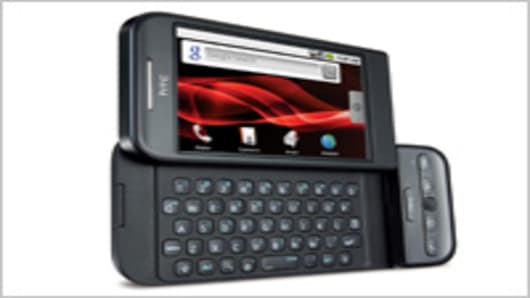The market research from yesterday showing that Google's Android operating system phones had surpassed Apple's iPhone in terms of US marketshare grabbed an enormous press attention. A chink in Apple's armor? A big feather in Google's cap? The tide shifting? Momentum swinging Google's way?
Not so fast, says Apple itself in an uncharacteristic rebuttal to the NPD market research this morning. The background is that NPD reported yesterday that smartphones using Android controlled about 28 percent of the domestic market, in terms of unit sales during the first quarter. That beat the 21 percent NPD says Apple enjoyed. Research in Motion, by the way, was still at number 1 with 36 percent.
But as you might expect, with the huge year over year gains iPhone has enjoyed, Google's leapfrog to the second spot was certainly worthy of big-time attention. Apple though disagrees, and is doing so publicly.
Apple spokeswoman Natalie Harrison tells me the NPD report was "very limited," polling 150,000 consumers in an online survey, and doesn't adequately address the 85 million iPhone and iPod Touch users around the world. (Apple has sold about 51 million iPhones in the 3 years of its availability.)
"It's not truly representative of the truth of the matter," Harrison says. She also points to the buy-one-get-one-free promotions as skewing NPD's numbers. When a carrier sells a phone and gives another one away for free, it's counted as two phones toward market share and that's unfair, she says.
In fact, on a global basis, Harrison says, iPhone far outsells Android, and cites an IDC report a week earlier showing iPhone with 16.1 percent of the world's market, behind Nokia and RIM respectively.
This is a tough day for Google, despite the NPD figures. We learned that Sprint is joining Verizon in choosing not to sell Google's own, branded Nexus One smart phone. And now Apple itself is firing back, on the attack, questioning NPD's market research.
Apple's furor follows the company's new, aggressive messaging of late. (Just ask the folks over at Gizmodo.) We've been talking about this on our Titans series through the day today, that Steve Jobs is firmly back in charge of this company, and his style is permeating every aspect of Apple's strategy.
Typically, this company and its messengers work behind the scenes at getting talking points out in the open. Sometimes we in the media bite, sometimes we don't. This time around, there's no mistaking Apple on the offensive. Not just a message, but a messenger, by name, eschewing the typical "no comments" that characterize Apple's usual PR strategy.
It's a welcome change, to be sure.
Meantime, the NPD results started to raise questions that Google's licensing approach to Apple's proprietary strategy when it comes to operating systems harkened back to Apple's original decision about the Mac.
While Microsoft was out there trying to get as many manufacturers as it could to run its software, Apple was happy to go it alone. The rest, as they say, is certainly history, with Mac enjoying 4, 5, or even 10 percent of the computer market, with Microsoft devouring virtually all the rest.
Some wags began to wonder overnight if the NPD numbers from yesterday were a sign that Apple was headed down the same path: better software, a better experience, but on its way to niche-dom once again because it is going it alone again.
Apple will tell you that it is hardly lonely: tens of thousands of developers created hundreds of thousands of apps. Apple says the benefit of controlling the hardware and software is all about focus.
Still, if you want to know how competitive the smartphone market is right now, look no further than Apple, crawling out of its shell and taking on market research from a very well-known information aggregator. Google? Your move.
Questions? Comments? TechCheck@cnbc.com


